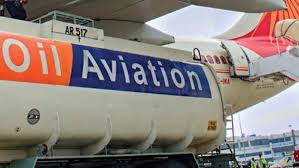 With airlines struggling to make money even when passenger traffic is growing at a double-digit pace, the civil aviation ministry has sought a major tax rejig on fuel to make the business of aviation more sustainable.
With airlines struggling to make money even when passenger traffic is growing at a double-digit pace, the civil aviation ministry has sought a major tax rejig on fuel to make the business of aviation more sustainable.
In a note last month, the aviation ministry appealed to the Centre and the states to bring aviation turbine fuel (ATF) under the ambit of the goods and services tax (GST). It also wanted ATF for big commercial jetliners to be capped at 18%, and requested state governments to support the proposal at the GST Council.
For smaller aircraft weighing less than 40 tons at take off, it suggested that the rate be capped at 5%. ATR aircraft, widely used by airlines that operate on routes chosen for the Udey Desh ka Aam Naagarik (UDAN) scheme, belong to this category. The scheme aims to improve air connectivity to smaller cities.
Currently, AFT prices vary from state to state. In Maharashtra and Delhi, it attracts 25% tax. There is no difference in rates on the basis of the size of the aircraft.
Civil aviation Secretary RN Choubey said the issue will be taken up by the GST Council.
Bringing AFT in the GST regime, according to an official, would provide stability and predictability on fuel prices for the airlines. Most state governments, so far, have opposed the inclusion of oil prices in the GST regime.
Fuel accounts for 40 % of the cost for airlines and in recent months, oil-market volatility and a steep fall in the value of the rupee against the dollar has left many air carriers bleeding.
IndiGo, run by InterGlobe Enterprises, India’s largest airline by passengers carried with a 39% market share , posted a loss of ₹652.13 crore in the September quarter, its first since being listed on the stock markets in November 2015.
Jet Airways founder Naresh Goyal has agreed to sell his controlling stake in the airline and give up operational control of the struggling carrier, television news channel CNBC TV18 reported recently, citing multiple people familiar with the matter.
In such a scenario, the aviation ministry has already indicated that it will take longer to implement higher fines for baggage losses and delays in takeoffs.
Now, the ministry has pointed out, in the note reviewed by Hindustan Times, that just about 50 goods such as tobacco, alcohol and luxury items attract the maximum 28% GST and it would not be appropriate to levy the same rate on aircraft fuel, which is essential for passenger service.
Since it was rolled out on July 1, 2017, the GST regime has been tweaked several times as the GST Council, which is made up of the central finance minister and his state counterparts, took into consideration the difficulties being experienced by taxpayers.
Apart from the civil aviation ministry, the tourism ministry too has demanded lower GST rates on cruise tourism and luxury hotel rooms, arguing that high rates (28%) have a negative impact on the hospitality industry. Any changes in the tax rates have to be decided by the GST Council.
To give further relief to the domestic carriers, the aviation ministry has reiterated that it is not willing to revisit the issue of airline ticket pricing amid demands for a cap on fares. The ministry’s note cited an order from the Competition Commission of India that controlling airfares would be contrary to competition law.
“Not only the government should bring ATF under GST, the decision to increase customs duty on ATF from zero to 5% should also be rolled back,” said Mark Martin, founder and CEO of Dubai-based Martin Consulting.
Source: Hindustan Times
We have launched Single Platform on GST Compliances In India, assisting in 4 areas – 1) Compliances, 2) Litigations & Hearings, 3) Training 4) Consultancy. Click this link for any assistance.
 customersuccess@taxmantra.com
customersuccess@taxmantra.com Toll Free:
Toll Free:  Contact Us
Contact Us

